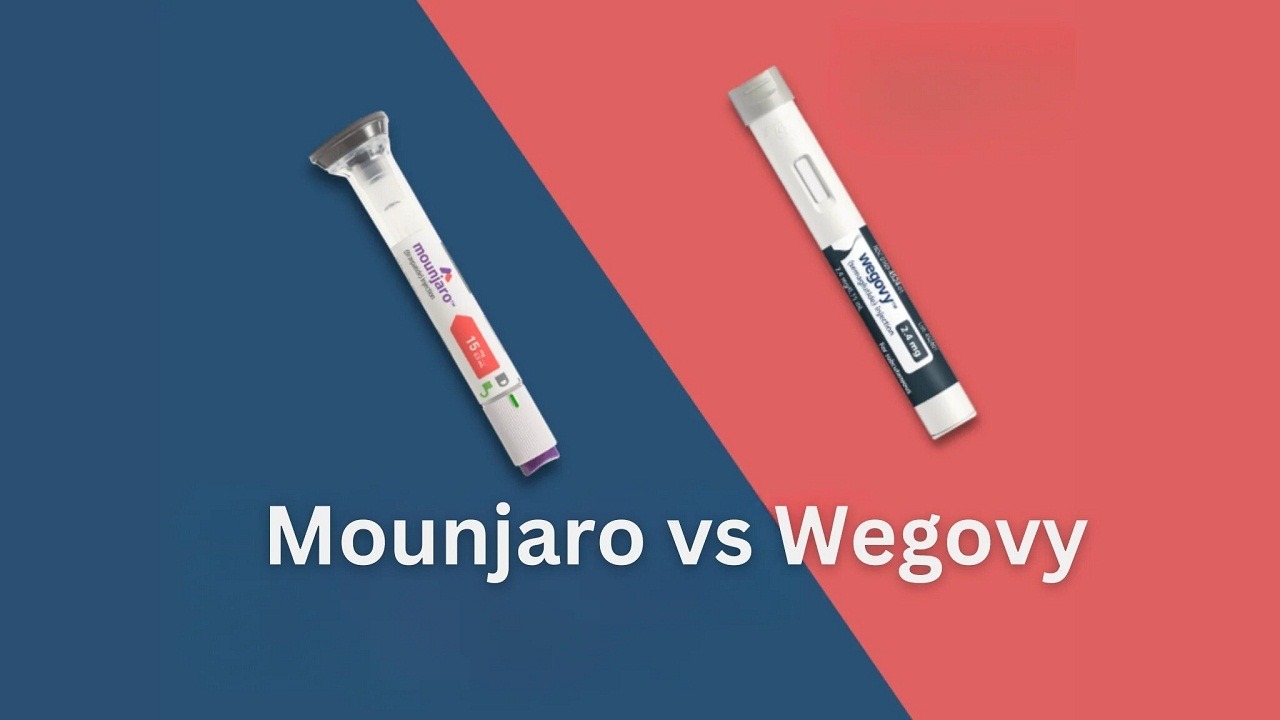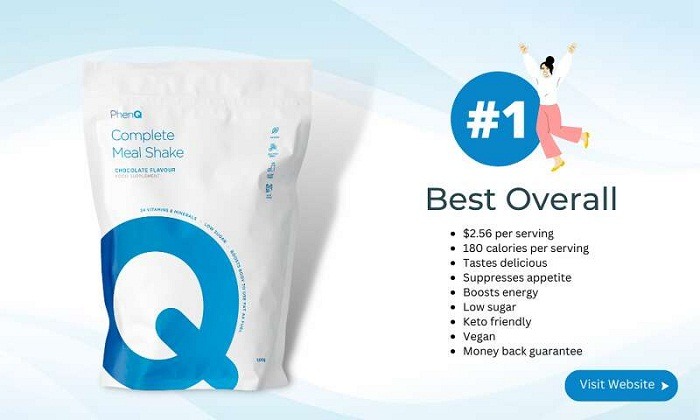Wegovy vs Mounjaro
Contents
- 1 Wegovy vs Mounjaro
- 2 FDA-Approved Uses: Understanding the Distinction
- 3 Minding the Mechanism: How They Work
- 4 The Weighing Game: Effectiveness for Weight Loss
- 5 Blood Sugar Control: Balancing the Scales
- 6 Injection Regimen: Frequency and Location
- 7 Side Effects: Potential Discomforts
- 8 Cost and Insurance Coverage: Weighing Your Wallet
- 9 Wegovy vs. Mounjaro Comparison
- 10 Making the Right Choice: Individual Needs Take Center Stage
- 11 Engaging Your Doctor: A Collaborative Approach
- 12 Conclusion: Navigating the Path to Success
- 13 FAQs: Wegovy vs Mounjaro
- 14 References:
In the battle against weight management and type 2 diabetes, new injectable medications like Wegovy and Mounjaro are emerging as powerful tools. Both drugs belong to a class known as glucagon-like peptide-1 (GLP-1) receptor agonists, but they have some key differences. Deciding which one might be right for you requires understanding these distinctions.
Related Post: Semaglutide (Ozempic, Wegovy, Rybelsus) | Uses, Benefits, Side Effects, And Results
This comprehensive Wegovy vs Mounjaro guide will delve into the details of Wegovy and Mounjaro, comparing their:
- FDA-approved uses
- Mechanisms of action
- Effectiveness for weight loss and blood sugar control
- Dosage and administration
- Side effects
- Cost and insurance coverage
- Considerations for individual needs
FDA-Approved Uses: Understanding the Distinction
The most crucial difference between Wegovy and Mounjaro lies in their FDA-approved applications:
- Wegovy: Wegovy is specifically approved by the FDA for chronic weight management in adults with obesity (BMI ≥ 30 kg/m²) or overweight (BMI ≥ 27 kg/m²) with at least one weight-related comorbidity, such as high blood pressure, type 2 diabetes, or dyslipidemia (abnormal cholesterol levels).
- Mounjaro: Mounjaro is currently only FDA-approved to treat type 2 diabetes in adults. However, studies have shown significant weight loss as a side effect, leading to off-label use for weight management. It’s important to note that off-label use hasn’t been evaluated by the FDA for safety and effectiveness in this context.
Minding the Mechanism: How They Work
Both Wegovy and Mounjaro mimic the actions of natural hormones called incretins, specifically GLP-1. These hormones play a crucial role in regulating blood sugar and appetite. Here’s a breakdown of their mechanisms:
Wegovy (semaglutide): Wegovy acts by mimicking GLP-1, leading to several effects:
- Increased insulin secretion from the pancreas after meals
- Decreased glucagon release, which lowers blood sugar production
- Delayed stomach emptying, promoting feelings of fullness and reducing appetite
- Increased satiety and decreased calorie intake
Mounjaro (tirzepatide): Mounjaro takes a slightly different approach. It acts as a dual agonist, mimicking both GLP-1 and another incretin hormone called glucose-dependent insulinotropic polypeptide (GIP). This dual action provides additional benefits for blood sugar control:
- Similar effects to Wegovy on GLP-1
- Stimulates insulin secretion in response to elevated blood sugar levels
The Weighing Game: Effectiveness for Weight Loss
While both medications can lead to weight loss, studies suggest Mounjaro might be slightly more effective:
- Wegovy: Studies show Wegovy can lead to an average weight loss of 15% or more when combined with a calorie-restricted diet and exercise program.
- Mounjaro: Research indicates Mounjaro can achieve an average weight loss exceeding 20% at the highest dose, again, in conjunction with lifestyle modifications.
It’s important to remember that these are average results, and individual experiences may vary. Factors like starting weight, overall health, and adherence to diet and exercise can influence weight loss outcomes.
Blood Sugar Control: Balancing the Scales
For individuals with type 2 diabetes, both medications offer significant benefits in managing blood sugar levels:
- Wegovy: While primarily used for weight management, Wegovy has been shown to improve blood sugar control in people with type 2 diabetes.
- Mounjaro: Mounjaro is FDA-approved for treating type 2 diabetes, and studies demonstrate its effectiveness in lowering blood sugar levels. Its dual action on GLP-1 and GIP may provide slightly better blood sugar control compared to Wegovy.
Injection Regimen: Frequency and Location
Both Wegovy and Mounjaro are administered as weekly subcutaneous injections, meaning they are injected under the skin. The injection sites can be the abdomen, upper thigh, or upper arm. A doctor will typically train you or a caregiver on the proper injection technique.
- Wegovy: Wegovy comes in pre-filled pens with various dosage options, starting with a low dose and gradually increasing over time as tolerated.
- Mounjaro: Mounjaro is also available in pre-filled pens with a stepwise dosing approach, starting with a lower dose and increasing based on your response and tolerability.
Side Effects: Potential Discomforts
Like any medication, Wegovy and Mounjaro can cause side effects. The most common ones include:
- Gastrointestinal: Nausea, vomiting, diarrhea, constipation,Indigestion, stomach pain, abdominal discomfort (these side effects are usually mild and tend to improve with continued use)
- Injection site reactions: Redness, pain, itching, swelling (these reactions are typically mild and temporary)
- Headache
- Fatigue
Mounjaro may have some additional side effects compared to Wegovy, such as:
- Low blood sugar (hypoglycemia): This is more likely with Mounjaro due to its enhanced insulin-secretion effect.
- Gallstones: There is a slight increased risk of gallstones with Mounjaro, but the exact reason is not fully understood.
It’s crucial to discuss potential side effects with your doctor and report any concerning symptoms promptly.
Cost and Insurance Coverage: Weighing Your Wallet
Both Wegovy and Mounjaro are considered specialty medications, often carrying a higher price tag than traditional drugs. The exact cost can vary depending on your insurance coverage, pharmacy used, and specific dosage prescribed.
- Wegovy: Wegovy can be expensive, often costing several thousand dollars per month without insurance. However, some insurance plans may cover a portion of the cost, especially when used for weight management in patients with qualifying weight-related comorbidities.
- Mounjaro: Mounjaro is also a high-cost medication, potentially costing thousands of dollars per month without insurance. For patients with type 2 diabetes, insurance coverage may be more readily available. However, off-label use for weight loss might not be covered by insurance.
It’s essential to check with your insurance provider to understand your specific coverage for each medication and discuss potential cost-saving options with your doctor.
Wegovy vs. Mounjaro Comparison
| Medication | Uses (FDA-approved) | Benefits (weight loss) | Benefits (blood sugar control) | Side effects (common) | Side effects (additional) | Dosage | Cost | Results (weight loss) | Results (blood sugar control) |
| Wegovy | Weight management for obesity or overweight with a weight-related comorbidity | Average 15% or more | Improves blood sugar levels | Nausea, vomiting, diarrhea, constipation, injection site reactions, headache, fatigue | None | Weekly injections, starting dose gradually increases | Expensive (thousands of dollars per month without insurance) | 15% or more weight loss with diet and exercise | Improves blood sugar levels |
| Mounjaro | Type 2 diabetes in adults | Average 20% or more (off-label use for weight loss) | Improves blood sugar levels, potentially better for type 2 diabetes | Nausea, vomiting, diarrhea, constipation, injection site reactions, headache, fatigue | Low blood sugar, slightly increased risk of gallstones | Weekly injections, starting dose gradually increases | Expensive (thousands of dollars per month without insurance) | 20% or more weight loss with diet and exercise (off-label use) | Improves blood sugar levels, potentially better for type 2 diabetes |
Making the Right Choice: Individual Needs Take Center Stage
The decision between Wegovy and Mounjaro depends on your individual needs and circumstances. Here are some key factors to consider:
- Your primary goal: Are you primarily focused on weight management or managing type 2 diabetes?
- Weight loss expectations: While both medications can be effective, Mounjaro might offer slightly greater average weight loss.
- Blood sugar control: If managing type 2 diabetes is a top priority, Mounjaro’s dual action on GLP-1 and GIP might provide a slight advantage.
- Side effects: Discuss potential side effects with your doctor and consider your tolerance for specific symptoms.
- Insurance coverage and cost: Explore your insurance coverage for each medication and potential out-of-pocket costs.
Engaging Your Doctor: A Collaborative Approach
Ultimately, the best way to decide between Wegovy and Mounjaro is by having a comprehensive discussion with your doctor. They can assess your individual health history, weight loss goals, and blood sugar control needs.
Here are some questions to consider asking your doctor:
- Which medication might be more suitable for my specific situation?
- What potential benefits and side effects can I expect with each medication?
- Are there lifestyle modifications I can make alongside medication for optimal results?
- What monitoring strategies are necessary while taking these medications?
Wegovy and Mounjaro represent valuable tools in the fight against weight management and type 2 diabetes. By understanding their distinctions, potential benefits, and considerations, you and your doctor can make an informed decision. Remember, both medications work best in conjunction with a healthy diet and regular exercise program. With a collaborative approach and commitment to healthy lifestyle changes, you can achieve lasting success on your weight management or blood sugar control journey.
FAQs: Wegovy vs Mounjaro
Q: Are Wegovy and Mounjaro the same medication?
A: No, although they belong to the same class of drugs (GLP-1 receptor agonists) and share some similarities, they have key differences. Wegovy is specifically approved for weight management, while Mounjaro is FDA-approved for type 2 diabetes but can lead to weight loss as a side effect.
Q: Which medication is more effective for weight loss?
A: Studies suggest Mounjaro might be slightly more effective for weight loss, with an average of 20% or more compared to Wegovy’s 15% or more. However, individual results may vary.
Q: Which medication is better for type 2 diabetes?
A: Mounjaro is FDA-approved for type 2 diabetes, and its dual action on GLP-1 and GIP might provide slightly better blood sugar control compared to Wegovy.
Q: What are the side effects of Wegovy and Mounjaro?
A: Both medications share common side effects like nausea, vomiting, diarrhea, constipation, injection site reactions, headache, and fatigue. Mounjaro may additionally cause low blood sugar and a slightly increased risk of gallstones.
Q: How much do Wegovy and Mounjaro cost?
A: Both are considered specialty medications and can be expensive, costing thousands of dollars per month without insurance. Coverage varies, with Wegovy potentially covered for weight management with a comorbidity and Mounjaro covered for type 2 diabetes. Off-label use of Mounjaro for weight loss might not be covered.
Q: How do I decide which medication is right for me?
A: Consult your doctor! They can assess your individual needs, weight loss goals, blood sugar control requirements, potential side effects, and insurance coverage to help you make an informed decision.
References:
- National Institutes of Health: https://www.niddk.nih.gov/health-information/health-statistics/overweight-obesity
- American Diabetes Association: https://diabetes.org/
- Wegovy (semaglutide) Prescribing Information: https://www.ozempic.com/prescribing-information.html
- Mounjaro (tirzepatide) Prescribing Information: https://www.accessdata.fda.gov/drugsatfda_docs/label/2022/215866s000lbl.pdf
- A review of the comparative efficacy and safety of glucagon-like peptide-1 receptor agonists for weight management: https://pubmed.ncbi.nlm.nih.gov/36507900/
Disclaimer: This information is for educational purposes only and should not be construed as medical advice. Please consult with your doctor to determine the best course of treatment for you.



